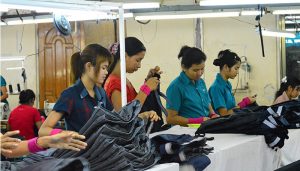 Apparel factories in Myanmar may close and around 400,000 workers turn jobless if the European Union (EU) removes Myanmar’s trade benefits under the generalised system of preferences (GSP), business and labour leaders in the country recently cautioned. The concern is apparently more about the long-term impact of the proposed decision rather than the immediate fallout. The EU accounted for $1.8 bn, i.e., 72 per cent, of Myanmar’s garment exports last year.
Apparel factories in Myanmar may close and around 400,000 workers turn jobless if the European Union (EU) removes Myanmar’s trade benefits under the generalised system of preferences (GSP), business and labour leaders in the country recently cautioned. The concern is apparently more about the long-term impact of the proposed decision rather than the immediate fallout. The EU accounted for $1.8 bn, i.e., 72 per cent, of Myanmar’s garment exports last year.
EU representatives recently met Myanmarese businessmen and labour union leaders in Yangon to discuss removing the country’s preferential trade status, as a punitive measure for the failure of the government to resolve the humanitarian crisis in the Rakhine State, according to a report.
U Naw Aung, Vice Chair of Myanmar Industries Craft and Services Trade Union Federation, who attended the meeting, said keeping in view the country’s unstable labour sector, the decision would hit the garment sector the hardest and not the government or the military. People would go deeper into poverty, Naw Aung was quoted as saying.
Another attendee U Khin Maung Aye, Managing Director of Lat War garment factory, said the proposed the EU decision is being opposed because it has no connection with the country’s political situation. According to the International Labour Organisation (ILO) and Myanmar Garment Manufacturers Association, the textile and garment industry in the country employs nearly 700,000 people – 90 per cent women –and generates $2.7 bn in foreign exchange.
 Apparel factories in Myanmar may close and around 400,000 workers turn jobless if the European Union (EU) removes Myanmar’s trade benefits under the generalised system of preferences (GSP), business and labour leaders in the country recently cautioned. The concern is apparently more about the long-term impact of the proposed decision rather than the immediate fallout. The EU accounted for $1.8 bn, i.e., 72 per cent, of Myanmar’s garment exports last year.
Apparel factories in Myanmar may close and around 400,000 workers turn jobless if the European Union (EU) removes Myanmar’s trade benefits under the generalised system of preferences (GSP), business and labour leaders in the country recently cautioned. The concern is apparently more about the long-term impact of the proposed decision rather than the immediate fallout. The EU accounted for $1.8 bn, i.e., 72 per cent, of Myanmar’s garment exports last year.

















